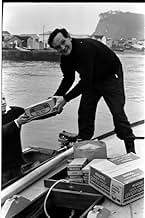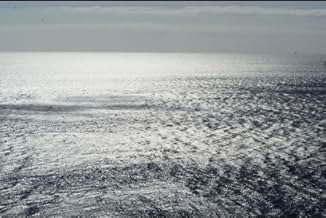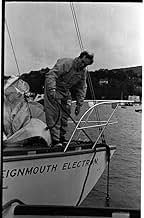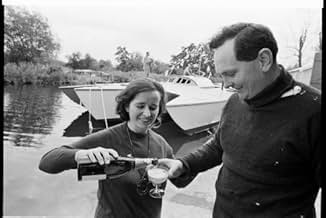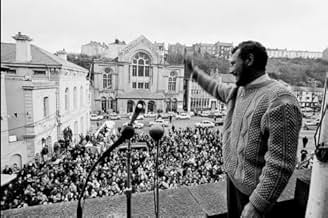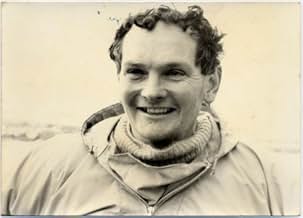VALUTAZIONE IMDb
7,8/10
3384
LA TUA VALUTAZIONE
Aggiungi una trama nella tua linguaA documentary about the disastrous 1968 round-the-world yacht race.A documentary about the disastrous 1968 round-the-world yacht race.A documentary about the disastrous 1968 round-the-world yacht race.
- Regia
- Sceneggiatura
- Star
- Premi
- 4 vittorie e 2 candidature totali
Donald Crowhurst
- Self - Golden Globe Race Competitor
- (filmato d'archivio)
Santiago Franchessi
- Self - Former Coastguard, Rio Salado
- (as Santiago Franchessie)
Stanley Best
- Self - Donald Crowhurst's Financier
- (filmato d'archivio)
Chay Blyth
- Self - Golden Globe Race Competitor
- (solo nei titoli)
Alex Carozzo
- Self - Golden Globe Race Competitor
- (filmato d'archivio)
Francis Chichester
- Self - July 1967, Francis Chichester Knighted
- (filmato d'archivio)
Loïck Fougeron
- Self - Golden Globe Race Competitor
- (solo nei titoli)
Rodney Hallworth
- Self - Donald Crowhurst's Public Relations Officer
- (filmato d'archivio)
Recensioni in evidenza
10fwomp
Have you ever found yourself watching a film or documentary and having to hold yourself back from screaming things like "No! Don't do it!"? No? Well it's time you do. And undoubtedly DEEP WATER is the one to get you started.
The story is based on that of Donald Crowhurst and his entry into the first round-the-world yacht race to be undertaken by individuals in 1968. That word "individuals" is important, as the men who set off on this nearly suicidal escapade head out alone.
Most of the men are well-knowns in the sea-faring communities of England (where they launch from), but one of them is the "unknown dark horse," and his name was Donald Crowhurst. Struggling financially, Crowhurst enlists a backer who can take everything from him should he fail to at least attempt to make it through a large portion of the race. He could take his home, his property, everything.
Crowhurst now finds himself between a rock and ...well ...deep water: either attempt the race with an unproven ship and an unproven captain, or lose everything you own (which was significant since Crowhurst had a wife and several children). You'll note the term "unproven captain" in there, too. Not only was he unproven, he'd never been out on the open sea! Did I mention suicidal? Flicking between archival footage of the pre- and post-race, and those of Crowhurst's friends, family, and acquaintances of today, Deep Water is put together masterfully. Initially seen as a poor sap who got in over his head, the film gradually shows you the limited choices Crowhurst had after months and months out on the water. His ship leaks. Equipment breaks. Psyche stretched to the breaking point (and beyond). Crowhurst finds himself lost in an internal struggle with no successful way out. It is interesting, too, to see the psychological breaks that other racers have as they deal with their solitary confinement on-board their respective boats.
The wave-like emotions that you'll feel as you watch this astounding documentary may make you a bit ill (not unlike trying to get your sea-legs). And you'll probably be frustrated at the choices being made; perhaps just as frustrated as poor Mr. Crowhurst.
The ending is also amazing in that we get to see the actual ship that Crowhurst sailed, sitting deserted and rotting on a Caribbean beach ...not unlike other things that felt deserted and rotting toward the end of this poorly thought-out race.
Incredible.
The story is based on that of Donald Crowhurst and his entry into the first round-the-world yacht race to be undertaken by individuals in 1968. That word "individuals" is important, as the men who set off on this nearly suicidal escapade head out alone.
Most of the men are well-knowns in the sea-faring communities of England (where they launch from), but one of them is the "unknown dark horse," and his name was Donald Crowhurst. Struggling financially, Crowhurst enlists a backer who can take everything from him should he fail to at least attempt to make it through a large portion of the race. He could take his home, his property, everything.
Crowhurst now finds himself between a rock and ...well ...deep water: either attempt the race with an unproven ship and an unproven captain, or lose everything you own (which was significant since Crowhurst had a wife and several children). You'll note the term "unproven captain" in there, too. Not only was he unproven, he'd never been out on the open sea! Did I mention suicidal? Flicking between archival footage of the pre- and post-race, and those of Crowhurst's friends, family, and acquaintances of today, Deep Water is put together masterfully. Initially seen as a poor sap who got in over his head, the film gradually shows you the limited choices Crowhurst had after months and months out on the water. His ship leaks. Equipment breaks. Psyche stretched to the breaking point (and beyond). Crowhurst finds himself lost in an internal struggle with no successful way out. It is interesting, too, to see the psychological breaks that other racers have as they deal with their solitary confinement on-board their respective boats.
The wave-like emotions that you'll feel as you watch this astounding documentary may make you a bit ill (not unlike trying to get your sea-legs). And you'll probably be frustrated at the choices being made; perhaps just as frustrated as poor Mr. Crowhurst.
The ending is also amazing in that we get to see the actual ship that Crowhurst sailed, sitting deserted and rotting on a Caribbean beach ...not unlike other things that felt deserted and rotting toward the end of this poorly thought-out race.
Incredible.
If extreme activities (and I don't mean the Hollywood ones like UFC & X-Games) and the people who pursue them interest you then seek this doc out.
This is one of those truth-is-stranger-than-fiction tales of Donald Crowhurts's obsession to prove himself against great odds. Those odds were stacked by Mother Nature, the media and his own mind. It is also about a time lost to us --although it was only 40 years ago.
The filmmakers have done a great job in gathering a wide range of material to tell his story and the story of the great race that consumed him.
I couldn't help but to think about Timothy Treadwell and the Apollo astronauts in the 2 great docs GRIZZLY MAN and IN THE SHADOW OF THE MOON while experiencing --you don't simply "watch"-- this story.
If you live in a big city buy it or rent it. It is worth the effort to find. I had to travel 100 miles to L.A. to buy it and I am glad I did.
This is one of those truth-is-stranger-than-fiction tales of Donald Crowhurts's obsession to prove himself against great odds. Those odds were stacked by Mother Nature, the media and his own mind. It is also about a time lost to us --although it was only 40 years ago.
The filmmakers have done a great job in gathering a wide range of material to tell his story and the story of the great race that consumed him.
I couldn't help but to think about Timothy Treadwell and the Apollo astronauts in the 2 great docs GRIZZLY MAN and IN THE SHADOW OF THE MOON while experiencing --you don't simply "watch"-- this story.
If you live in a big city buy it or rent it. It is worth the effort to find. I had to travel 100 miles to L.A. to buy it and I am glad I did.
Deep Water (2006) ****
"It is indifferent... it's there waiting for you to make one slip up." Those words (paraphrased) are perhaps the best sum up of the nature of the ocean I have ever heard muttered. Its furies are boundless, not least of which, her loneliness. Those words come from the mesmerizing and heartbreaking documentary Deep Water. It is the story of Donald Crowhurst, an amateur sailor who partook in the 1969 Sunday Times Race around the World. If you do not know his story, it may be best to stop reading now. Don't read this or any other information on Crowhurst or the race. Find the film and just watch it.
After the first solo circumnavigation of the ocean in 1967, adventurers and watchers of adventurers began seeking the next one-up. This time the journey would have to be done without making landfall or stopping along the way. Having fallen on hard times, Crowhurst saw the race as a great chance to get his family back on their feet. He had lived through financial hardships as a child, and wanted part in going back to such a life. So he set out to find sponsors, and soon did in Stanley Best and Rodney Hallworth. The two men spelled the potential cash cow, and granted Crowhurst a boat, on the condition that if he should pull out of the race he would be forced himself to pay the expenses. His boat however was in serious need of repairs, and he feared it would not be ready in time for the final departure day. He was informed however by his sponsor's that he simply must go after all, they ponied up the dough and expected it back many a time over.
The details of the story are infamous: Crowhurst's boat began taking on water, and his progress slowed to a crawl. Faced with the decision of trying to round the horn of Africa (certain death in such a boat) or turn back (financial devastation and destitution), he searched for a third option. He chose to hide out, alone on his yacht, waiting for other competitors to round Cape Horn in South America. From there he would rejoin the race. He reported false positions, and record breaking speeds. Then he stopped all communication for fear that his position would be given away. He also had to painstakingly construct fake log books for each day of a journey he did not take. Eventually the loneliness, the guilt, and the realization that he would likely be caught weighed too heavy on Crowhurst. His final log entries make the musings of a Kurtz seem entirely sane. Only a few weeks from home, he turned his boat away from home, and is reported to have jumped overboard soon thereafter.
Crowhurst's odyssey is a fascinating one, and its ending is heartbreaking, but strikes of inevitability. Our dreams so often turn into fears, and the consequences of our actions often leave us so few options for a happy ending. It is a story of a descent into madness, teased on by the infinite abyss of the cruel seas. The filmmakers do a wonderful job in telling this story. It's put together with chilling audio and video recordings done by Crowhurst, and narrations of his ever-increasingly maddening log notes. The story starts slowly, and may distract some viewers, but the rewards of the story are entirely worthwhile as it progresses.
There are also inquiries into some of the other competitors, such as Frenchman Bernard Moitessier, who was on par to likely win the speed competition, only to pull out and begin a second trip around the world. Also in the film is Robin Knox-Johnston, who was the winner of the competition. He donated his prize money to the Crowhurst family.
To read briefly on the Crowhurst saga simply does not do justice. It's interesting of course, but a quick browse bypasses the raw emotions and oddness presented here. The final moments of Deep Water are genuinely heart breaking, hearing the thoughts of his widowed family, and the adoration and understanding of his friends. This is a fascinating story, and it is that which carries the documentary into such great channels.
"It is indifferent... it's there waiting for you to make one slip up." Those words (paraphrased) are perhaps the best sum up of the nature of the ocean I have ever heard muttered. Its furies are boundless, not least of which, her loneliness. Those words come from the mesmerizing and heartbreaking documentary Deep Water. It is the story of Donald Crowhurst, an amateur sailor who partook in the 1969 Sunday Times Race around the World. If you do not know his story, it may be best to stop reading now. Don't read this or any other information on Crowhurst or the race. Find the film and just watch it.
After the first solo circumnavigation of the ocean in 1967, adventurers and watchers of adventurers began seeking the next one-up. This time the journey would have to be done without making landfall or stopping along the way. Having fallen on hard times, Crowhurst saw the race as a great chance to get his family back on their feet. He had lived through financial hardships as a child, and wanted part in going back to such a life. So he set out to find sponsors, and soon did in Stanley Best and Rodney Hallworth. The two men spelled the potential cash cow, and granted Crowhurst a boat, on the condition that if he should pull out of the race he would be forced himself to pay the expenses. His boat however was in serious need of repairs, and he feared it would not be ready in time for the final departure day. He was informed however by his sponsor's that he simply must go after all, they ponied up the dough and expected it back many a time over.
The details of the story are infamous: Crowhurst's boat began taking on water, and his progress slowed to a crawl. Faced with the decision of trying to round the horn of Africa (certain death in such a boat) or turn back (financial devastation and destitution), he searched for a third option. He chose to hide out, alone on his yacht, waiting for other competitors to round Cape Horn in South America. From there he would rejoin the race. He reported false positions, and record breaking speeds. Then he stopped all communication for fear that his position would be given away. He also had to painstakingly construct fake log books for each day of a journey he did not take. Eventually the loneliness, the guilt, and the realization that he would likely be caught weighed too heavy on Crowhurst. His final log entries make the musings of a Kurtz seem entirely sane. Only a few weeks from home, he turned his boat away from home, and is reported to have jumped overboard soon thereafter.
Crowhurst's odyssey is a fascinating one, and its ending is heartbreaking, but strikes of inevitability. Our dreams so often turn into fears, and the consequences of our actions often leave us so few options for a happy ending. It is a story of a descent into madness, teased on by the infinite abyss of the cruel seas. The filmmakers do a wonderful job in telling this story. It's put together with chilling audio and video recordings done by Crowhurst, and narrations of his ever-increasingly maddening log notes. The story starts slowly, and may distract some viewers, but the rewards of the story are entirely worthwhile as it progresses.
There are also inquiries into some of the other competitors, such as Frenchman Bernard Moitessier, who was on par to likely win the speed competition, only to pull out and begin a second trip around the world. Also in the film is Robin Knox-Johnston, who was the winner of the competition. He donated his prize money to the Crowhurst family.
To read briefly on the Crowhurst saga simply does not do justice. It's interesting of course, but a quick browse bypasses the raw emotions and oddness presented here. The final moments of Deep Water are genuinely heart breaking, hearing the thoughts of his widowed family, and the adoration and understanding of his friends. This is a fascinating story, and it is that which carries the documentary into such great channels.
Some of the most difficult journeys are the ones we make alone. Totally alone. Donald Crowhurst's journey was made before satellite positioning. When he sails over the horizon he is, in effect, alone with the universe. His mission: to be the first or the fastest to sail around the world non-stop.
"We are all human beings and we all have dreams." Such are the first words of Deep Water. The sea of troubles that Crowhurst encounters are more than just physical. In this spellbinding documentary, we see the daunting adventure that he and some of the other competitors undertake. We experience the different ways they come to grips with intimidating loneliness and horrifying psychological pressures.
Personally, I can't swim. I don't particularly like water and my Kiwi friends make fun of me. But even the waves of the best made Hollywood pictures come with a comfort zone of music, reassuring dialogue or other reminders that it is 'all pretend'. Not so with Deep Water. Bleak opening credits leave us in no doubt of the cruel and relentless nature of the sea - the physical and also the mental challenge. A friend of mine, a few years ago, sailed around the world with a very small group of other people, all experienced yachtsmen. When she came back, it was several years before she was herself again.
Deep Water starts in 1967. Francis Chichester has just circumnavigated the globe on his own, but with a brief stop in Sydney. The Sunday Times announces a competition for sailing single-handedly around the world non-stop. Crowhurst enters, with not only glory but the financial fortunes of his family at stake (having mortgaged his house). But as his wife says, "There is a moment when an opportunity arises - and if you don't grasp it, that's that." They are noticeably worried about the outcome. Last minute preparations are been rushed. Later we will find only one of the original nine final contestants ever returns.
Bernard Moitessier, within reach of the end and possible victory after six months alone at sea, discovers he has found peace in the vast loneliness. He changes course to begin a second circuit. Something inside him changes. Something changes inside Crowhurst too, but for him the inner journey is far more turbulent.
Deep Water, beautifully narrated by Tilda Swinton, is a moving and totally absorbing account of one man who gets in over his head both physically and morally. The small boat becomes a microcosm for life where a person has to find their own rules. Crowhurst's journey is not the journey of Sunday Times heroes, but of a man. His dilemma is dangerously easy to identify with. This is an incredibly moving story - if you don't already know the historical details, do see the film first.
"We are all human beings and we all have dreams." Such are the first words of Deep Water. The sea of troubles that Crowhurst encounters are more than just physical. In this spellbinding documentary, we see the daunting adventure that he and some of the other competitors undertake. We experience the different ways they come to grips with intimidating loneliness and horrifying psychological pressures.
Personally, I can't swim. I don't particularly like water and my Kiwi friends make fun of me. But even the waves of the best made Hollywood pictures come with a comfort zone of music, reassuring dialogue or other reminders that it is 'all pretend'. Not so with Deep Water. Bleak opening credits leave us in no doubt of the cruel and relentless nature of the sea - the physical and also the mental challenge. A friend of mine, a few years ago, sailed around the world with a very small group of other people, all experienced yachtsmen. When she came back, it was several years before she was herself again.
Deep Water starts in 1967. Francis Chichester has just circumnavigated the globe on his own, but with a brief stop in Sydney. The Sunday Times announces a competition for sailing single-handedly around the world non-stop. Crowhurst enters, with not only glory but the financial fortunes of his family at stake (having mortgaged his house). But as his wife says, "There is a moment when an opportunity arises - and if you don't grasp it, that's that." They are noticeably worried about the outcome. Last minute preparations are been rushed. Later we will find only one of the original nine final contestants ever returns.
Bernard Moitessier, within reach of the end and possible victory after six months alone at sea, discovers he has found peace in the vast loneliness. He changes course to begin a second circuit. Something inside him changes. Something changes inside Crowhurst too, but for him the inner journey is far more turbulent.
Deep Water, beautifully narrated by Tilda Swinton, is a moving and totally absorbing account of one man who gets in over his head both physically and morally. The small boat becomes a microcosm for life where a person has to find their own rules. Crowhurst's journey is not the journey of Sunday Times heroes, but of a man. His dilemma is dangerously easy to identify with. This is an incredibly moving story - if you don't already know the historical details, do see the film first.
10SimcC
Deep Water examines the pressures and ambitions on an ordinary man in a compelling documentary. The testimony and archive footage are a fascinating insight to the late 1960's and a ground-breaking round the world yacht race. The personal conflicts of duty to family, self and reputation are played out in one of the most memorable and affecting films I have seen. I was not familiar with the history of this story and the drama was successfully and clearly directed. The story is mostly respectful to the participants with heroes and villains implied rather than ruthlessly exposed. Most of the interpretation is left open to the viewer allowing room to personally relate to the situations and characters. This movie is a bitter sweet experience with an entertaining mix of thoughtful suspense, joy and drama.
Lo sapevi?
- QuizThe movie Il mistero di Donald C. (2018) focuses on the story and race of Donald Crowhurst (played by Colin Firth)
- Citazioni
Self - Crowhurst's Closest Friend: I think doubt started to set in... when reality started to set in. And that reality wasn't quite as perfect as the idea. This is why ideas are dangerous.
- ConnessioniEdited into Independent Lens: Deep Water (2008)
I più visti
Accedi per valutare e creare un elenco di titoli salvati per ottenere consigli personalizzati
- How long is Deep Water?Powered by Alexa
Dettagli
Botteghino
- Lordo Stati Uniti e Canada
- 271.143 USD
- Fine settimana di apertura Stati Uniti e Canada
- 22.632 USD
- 26 ago 2007
- Lordo in tutto il mondo
- 742.576 USD
- Tempo di esecuzione
- 1h 33min(93 min)
- Colore
- Mix di suoni
- Proporzioni
- 1.85 : 1
Contribuisci a questa pagina
Suggerisci una modifica o aggiungi i contenuti mancanti


